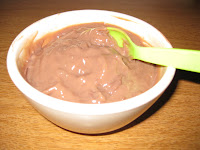
Easy Microwave Pudding
Ingredients:
1 tablespoon cornstarch
2 tablespoons sugar (or sugar substitute)
1 tablespoon cocoa powder (optional)
1 cup nonfat milk
1/2 teaspoon vanilla extract
Directions:
1. In a microwave-safe bowl, mix together the cornstarch, sugar, and cocoa until uniform and lump-free.
2. Pour in the milk and stir well.
3. Place the bowl on a large plate and microwave it on high for 4 minutes. Remove the pudding every 30 seconds and stir it well making sure there are no lumps.
4. Stir in the vanilla.
5. Chill it in the refrigerator for an hour or more and then enjoy!
Hints:
· For chocolate pudding, use cocoa powder, and for vanilla pudding, omit the cocoa. You could also make different flavored puddings using orange extract, lemon extract, mint extract, honey, maple syrup, or spices like cinnamon and nutmeg.
· For a thicker pudding, use more cornstarch, and for a thinner consistency, use less.
· This pudding is delicious served warm or cold, and pairs well with fresh berries or bananas.
1 tablespoon cornstarch
2 tablespoons sugar (or sugar substitute)
1 tablespoon cocoa powder (optional)
1 cup nonfat milk
1/2 teaspoon vanilla extract
Directions:
1. In a microwave-safe bowl, mix together the cornstarch, sugar, and cocoa until uniform and lump-free.
2. Pour in the milk and stir well.
3. Place the bowl on a large plate and microwave it on high for 4 minutes. Remove the pudding every 30 seconds and stir it well making sure there are no lumps.
4. Stir in the vanilla.
5. Chill it in the refrigerator for an hour or more and then enjoy!
Hints:
· For chocolate pudding, use cocoa powder, and for vanilla pudding, omit the cocoa. You could also make different flavored puddings using orange extract, lemon extract, mint extract, honey, maple syrup, or spices like cinnamon and nutmeg.
· For a thicker pudding, use more cornstarch, and for a thinner consistency, use less.
· This pudding is delicious served warm or cold, and pairs well with fresh berries or bananas.


